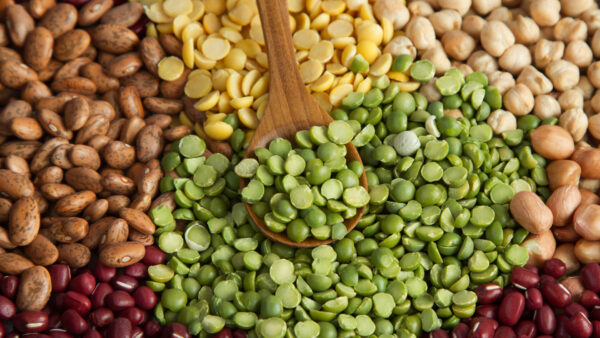Plant proteins - all well and good.... but what about the taste ?

Focus on plant proteins. The sector is expanding rapidly but faces a real challenge. The products currently available are not entirely satisfactory in terms of taste and sensation in the mouth. In response to this, our R&D team has developed new formulations from which we have created a range of deliciously innovative nutritional solutions.
Plant proteins – a rapidly expanding market
We know that proteins are one of the essential ingredients in our diet. Plant proteins are particularly interesting from a health-nutrition aspect because of the sensation of satiety they generate coupled with their numerous biological functions (regeneration of the skin and muscle tissues, preservation of the bone and muscle mass). Although the beneficial properties of animal proteins have long since been recognised, the benefits of plant proteins have come to the fore.
However, the plant protein market has been expanding rapidly in recent years. Generating sales of $ 8,35 billion in 2016, it would rich $ 14,22 billion by 2022, 70% growth in six years (source Research and Markets).
A change of this magnitude can be attributed to profound changes in society: an awareness of dietary issues from a health perspective but also from an ecological and ethical standpoint. Vegetarians, vegans and even flexitarians, diets banning animal proteins, are becoming increasingly popular and high demands for diets of this nature have led to the diversification and increase in the range of plant proteins available. The market potential doesn’t stop there and impacts upon many other areas such as health, well-being, dietetics and sport, etc.
Combining nutritional quality and taste
There are four categories of plant proteins. The first comprises algae and plants. The most well-known of these is spirulina, with a protein content of up to 65%. Chlorella is also excellent for its detoxifying properties. Another example, moringa, also known as the tree of life, provides 18 amino acids, 9 of which are essential for humans. Second category: cereals comprising essentially quinoa, rice, hemp and oat bran, etc. Plant proteins can also be found in leguminous plants such as lentils, split peas and even soya. Last source of plant proteins: oilseed products. These include almonds, pumpkin, sunflower and flax seeds, etc.
Each of these plant proteins has its own characteristics. Thorough knowledge of these characteristics allows us to combine plant proteins from different sources in order to accumulate beneficial properties. Thus, leguminous proteins, which are often slow and difficult to digest, can be complemented by cereals or oilseed proteins, which have the opposite effect. Another example, i.e. peas or rice, contain only a few of the 20 essential amino acids, but these can be combined with other plant proteins to guarantee a better nutritional intake. Depending on the market for which the nutraceutic product and its proven properties are intended, we will develop tailor-made formulations to suit your requirements.
In some plant proteins, taste may pose a problem. Although consumers are looking for natural, ethical products that have a beneficial effect on their health, they are not prepared to compromise on pleasure. Flavour is still a purchasing criterion and a key factor in customer loyalty. It is therefore one of the major innovation stakes as far as this market is concerned. In some developed products, plant proteins are often poorly dispersed, hence the presence of unpleasant grains in the mouth. This creates an unpleasant sensation and deceptive taste.
The challenge taken up by JLB: products that do not compromise on taste
To overcome this problem, the JLB Development R&D team has devised innovative formulations to develop new products produced with natural ingredients, moving away from taste constraints: peas, rice, almonds, spirulina, hemp, soya or even chlorella. We offer powdered protein drinks and smoothies to target both the sport and dietetics markets. A range of products where product taste and sensory appearance are of paramount importance. Our research has led to optimal dispersion of the powder and a reduction in the number of unpleasant seeds/grains in the mouth. The improved flavour also overcomes the unpleasant taste of plant proteins for the uninitiated. Do not hesitate to contact us for product samples.


